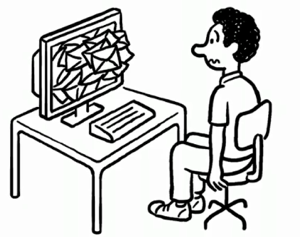As much as it pains me to write this, I would rather you send an email
Even though I have a 'hate-hate' relationship with email, as many of us do, I have to make my annual stand/defense/plea for email once again, even in 2016. I touched upon this issue in my 'Ways in which to contact me, ranked' post from late 2014, when I laid out a pretty persuasive argument for what I feel compelled to re-litigate once again in 2016. And that is unless you have some kind of prior understanding, or are corresponding with a close associate or friend that you know really, really well, the default medium for business communication still has to be email.
Hang on, I need a second before continuing with the post. I think I many have threw up in my mouth a little...
Ok, I am better. Here goes the rest of the take. While most of us, especially me, has come to loathe many elements of email, it remains the default communication media for global business. Everyone has email, everyone still uses email in some capacity, everyone in business understands you have to check your email at least daily, if not several times a day. It may be the lowest common denominator for business communication, but it is the common denominator nonetheless.
While most of us, especially me, has come to loathe many elements of email, it remains the default communication media for global business. Everyone has email, everyone still uses email in some capacity, everyone in business understands you have to check your email at least daily, if not several times a day. It may be the lowest common denominator for business communication, but it is the common denominator nonetheless.
And that can't be said for the seemingly 293 other ways that we can use, or try to use, to contact one another for business reasons. There are the obvious mechanisms from the popular social networks - Twitter, LinkedIn, Facebook, even Instagram. And then the less obvious ones like SnapChat or Skype. And most of those networks have multiple ways in which they can be used for communication - mentions, messages, private messages, tags, etc. It all adds up to an enormous set of potential 'places' to check for communications. And that is not mentioning old-fashioned phone calls, voice mails (which I hate), and text messages, (which I like).
Note, this rant is 99% directed at cross-organizational communications, not internal company communications between co-workers that in many cases are moving away from email and into alternate productivity and communication platforms like Slack or HipChat. Those tools may be fantastic at simplifying collaboration and reducing email volume, but they are almost always internal tools. In my role probably 90% of my communication is with people from outside my organization.
So when you send business and otherwise 'important' messages via one of these other media, (and you did not have an agreement or understanding to do that beforehand), you are creating two potential issues. One is that you are making a big assumption about the person you are contacting and their habits and preferences. You might even think that their methods are similar to yours. You may live all day sending Twitter or Facebook messages for work purposes, but that does not necessarily mean that I or anyone else does. I will admit here, I never check Twitter direct messages. I mean never.
Second, you are making an unfair ask of the person you are contacting via these messages to adapt to your preferred methods of communication. I have a LinkedIn account of course. But I do not want to conduct any meaningful correspondence in LinkedIn's messaging tool. It stinks to use. It is not searchable as far as I can tell. And it does not integrate with anything else. Frankly, it sucks. Just about every LinkedIn message I send says, 'Please send me an email directly on this.' I am not proud of this, but it is just how things have to be.
And a quick disclaimer for folks that know me and might know this: I am not always great at email. In fact, sometimes I am pretty terrible at email. But I am more terrible at the dozen other potential ways that I can be reached, many of which I never or rarely even check. I am looking at you Facebook messages.
Ok, that's the end of the 2016 version of my email/messaging/ways to contact me rant.
I wish things could be different. I do.
But until then, you, me, all of us, we are stuck with email.

 Steve
Steve



